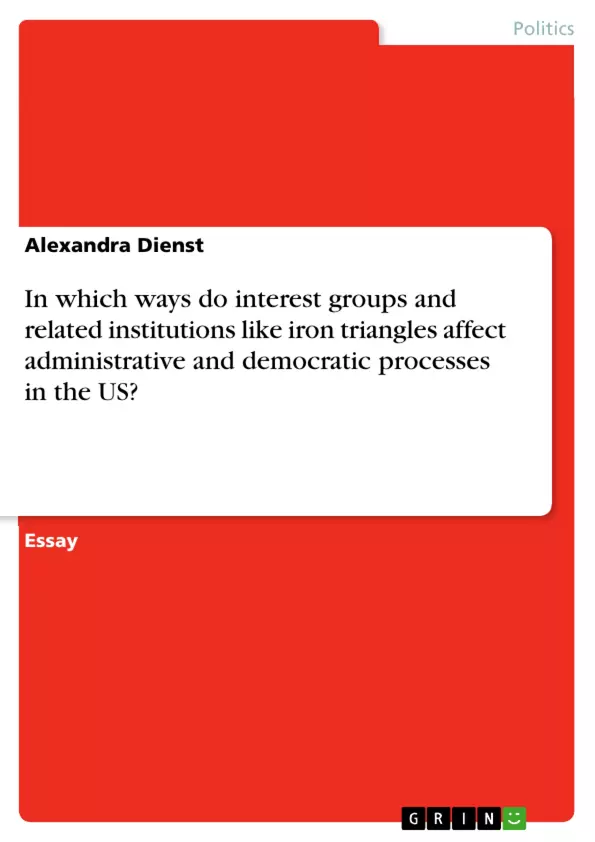Today, the American political system resembles more a pluralist than a majoritarian form of government. Policymaking is a cumulative result of the interaction between interest groups and the Government. The legislative procedure is affected by tensions between the executive, the legislature, and constituencies.
The clash between pluralism and majoritarianism is clearly visible. “In a society of nearly 300 million people divided into thousands of subcultures […], lobby groups expand democracy by letting minority groups and interests be heard over the simple arithmetic of a winner-take-all voting system of majority rule.”
While pluralists consider constituencies a good thing, a public survey reveals that two thirds of all Americans regard lobbying as a threat to democracy. The main accusation is that the weal of the electorate as a whole is sacrificed in favour of very special interest.
Table of Contents
- Introduction
- How do interest groups work, and how do they affect the American political system?
- PACS
- Iron Triangles
- Inequalities and problems aroused by interest groups
- Conclusion
Objectives and Key Themes
This essay explores the influence of interest groups and institutions like iron triangles on administrative and democratic processes in the United States. It examines how these groups can affect policymaking and influence public opinion. The essay also investigates the potential for interest groups to disproportionately benefit certain segments of society at the expense of others.
- The role of interest groups in American politics
- The influence of interest groups on policymaking
- The impact of iron triangles on administrative processes
- Potential inequalities arising from interest group activity
- The ethical implications of interest group lobbying
Chapter Summaries
- Introduction: This section provides a brief overview of the American political system and highlights the increasing role of interest groups in shaping policy decisions. It discusses the tension between pluralism and majoritarianism and the perception of lobbying as a threat to democratic values.
- How do interest groups work, and how do they affect the American political system?: This chapter defines interest groups, outlines their methods of operation, and explains their influence on the American political system. It discusses various lobbying techniques, including direct lobbying, grassroots lobbying, and information campaigns. The chapter also explores the use of litigation and legal advocacy as a means of achieving policy goals.
Keywords
The main keywords and focus topics of this essay include interest groups, lobbying, iron triangles, pluralism, majoritarianism, political participation, policymaking, public opinion, inequalities, and democratic processes. The essay also explores the impact of high-tech lobbying and the role of think-tanks in influencing policy decisions.
Frequently Asked Questions
What are "Iron Triangles" in US politics?
Iron Triangles are stable relationships between a federal agency, a congressional committee, and an interest group that cooperate to create and protect policies favorable to their mutual interests.
How do PACs (Political Action Committees) influence democracy?
PACs raise and distribute money to political candidates, allowing interest groups to financially support lawmakers who favor their specific agendas.
What is the difference between pluralism and majoritarianism?
Pluralism views politics as a competition between various interest groups representing minorities, while majoritarianism focuses on the will of the numerical majority of citizens.
Why do many Americans view lobbying as a threat?
Surveys show concerns that special interests sacrifice the general public welfare for their own gain, leading to political inequality and corruption.
How do interest groups use litigation to achieve goals?
When the legislative process fails, interest groups often file lawsuits or submit amicus curiae briefs to influence court decisions on key policy issues.
- Quote paper
- Alexandra Dienst (Author), 2005, In which ways do interest groups and related institutions like iron triangles affect administrative and democratic processes in the US?, Munich, GRIN Verlag, https://www.grin.com/document/48979



